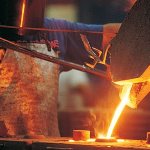 As manufacturers continue to recover from the Great Recession, here are five current and projected trends for the manufacturing sector.
As manufacturers continue to recover from the Great Recession, here are five current and projected trends for the manufacturing sector.
Capital Investment
The Philadelphia Federal Manufacturing Activity Index has reported twelve consecutive months of growth. Companies are seeing production increases along with increased optimism.
As manufacturers approach 80 percent production capacity, they begin to contemplate the need to bring on a new shift or invest in capital expenditures. Both options have positive impacts on the economy; however, companies are increasingly opting to make capital investments in new machinery or advanced technology rather than increasing their workforce. Kreischer Miller’s 2015 Greater Philadelphia Manufacturing Survey recently found that 61 percent of respondents noticed an increase in profitability from investments in capital equipment, while 53 percent noticed improvements from investing in their workforce.
Next-Shoring
Over the past few years, we’ve heard a lot about reshoring. Rising freight costs and increased wage pressure have made the Asian market less attractive for domestic manufacturers. As a result, many are now considering next-shoring to be the next best option.
Sourcingmag.com defines next-shoring as
“the transfer of business or IT processes to companies in a nearby country, often sharing a border with your own country.”
By relocating all or components of manufacturing operations to a closer location, companies can remain competitive with reduced lead times, comparable (or, in some cases, lower) labor costs, and fewer time zone issues.
Technology
Today’s manufacturing economy is driven by constant innovation. Innovation leads to improved processes, a safer manufacturing facility, increased output and, ultimately, increased enterprise value. Right now, robotics are at the forefront of manufacturing innovation.
Robots can be used to replace many of the tedious and potentially dangerous jobs currently performed by non-skilled labor. It is no secret that robotics will eliminate certain manufacturing jobs, but these jobs will be offset by new opportunities, such as maintaining and monitoring the robots. These new jobs will require additional training, resulting in the need for a more skilled workforce.
Internet of Things
The Internet of Things (IoT) is the concept that objects and people are connected via the use of embedded computing devices within the existing Internet infrastructure. The development of IoT within the manufacturing industry is a critical element of a more efficient means of production.
Currently, manufacturing processes do not communicate as well as they should. Many involve machines that run continuously, regardless of how other machines (input or output) are operating. As you can imagine, it is difficult to have all equipment operating at the same output level all of the time. IoT allows individual processes and machines to speak to each other through the use of various sensory devices.
IoT can go a long way toward improving efficiencies and reducing cost by providing real-time monitoring from anywhere in the world. And with the growth of consumer-based IoT products, the cost of microprocessors, sensors, and related wireless devices has become cheaper – making this a trend we expect to continue.
Green Sustainable Manufacturing
Organizational stakeholders are becoming increasingly aware of their responsibility to the environment and are asking, or in some cases, requiring their companies to become more environmentally friendly. According to the Institute of Defense Analysis’s Emerging Global Trends in Advanced Manufacturing,
“Advanced manufacturing processes will likely be more energy and resource efficient in the future, as companies strive to integrate sustainable manufacturing techniques into their business practices to reduce costs, to decrease supply-chain risks, and to enhance product appeal to some customers.”
With the right leadership and clearly defined objectives, green sustainable manufacturing holds potential economic benefits including long-term cost savings, waste reductions, and process efficiency improvements.
Download a copy of Kreischer Miller’s 2015 Greater Philadelphia Manufacturing Survey.
Brian J. Sharkey can be reached at Email or 215.441.4600.
You may also like:

